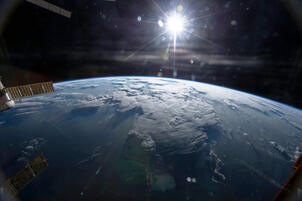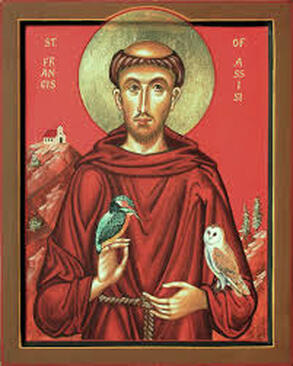We all go inevitably go through it. We sometimes don’t even know we are doing it. For example the human body sheds dead skin every day so new skin can grow. Because of our skin, we actually die these little deaths every day. Likewise, whenever we learn a new concept - especially one that causes an abstract thought to die only to be reborn as a new and hopefully evolved idea.Death, or the end of one thing, causes something new, and often the case, something better to happen. Some call it reincarnation. Some call it evolution. Some call it life. But the truth is, we live. We die. We are resurrected into something new. Thus, learning how to live (especially in this tension of life and death) will hopefully guide the way will die. To live well helps us to die faithfully. To find meaning in life despite our imminent death. To do this is to live with hope knowing we've been given this day to live out our best selves. Dying is an art form that is equally as important as living because out of death comes new life. The natural world is a perfect example of this. "The natural world itself is the supernatural,." writes Richard Rohr. It is a great teacher to help us understand this concept of death and resurrection. Think about it like this: A tree grows and produces acorns. In order for the acorn to drop it must cut itself off from it's life source, the tree. In one way or another, the acorn falls from the tree. It's buried by dead leaves that begin to breakdown both itself and the acorn. The shell eventually gives in and cracks open and a new tree begins to grow. Along the side of my house are the most impressive ferns. In the hottest summers I have watch them burn up and die. Come the next winter, if it’s wet enough, they come back again. Taking on a new shape, new color, and a new life. The science behind it is simple. Each leaf of the fern has tiny little spores that float in the air or drop to the ground and die. And in their death they are resurrected as a new plant complete with their own spores that will break away in the wind. The genius of Jesus' teaching is that he reveals this idea that God uses the tragedy, betrayal, pain and suffering and even death itself to bring us to a larger sense of who we are. Jesus taught, "Unless the single grain of wheat loses its shell, ir remains just a single grain (John 12:24). Our shells, the way we see things and do things, must be cracked for new growth to happen. It's the way we set our roots deep down in the darkness of the soil long before we push our way upward and begin to grow. In God's divine economy, everthing is used to create life...even death. Some call this science. Others call it God. But I think it's one in the same. What else could it be for one who believes in creationism? As Paul wrote, “from the beginning until now, the entire creation has been groaning and one great act of giving birth.” The divine, as Rohr argues, wants to manifest itself in visible form. We could make this argument for Jesus and the incarnation. We see how this mystery is keeps being recapitulated at every level of creation as it evolves, and emerges anew.
Think about that when you think about death. What is God doing in the science of life? It is more than an evolutionary body, it is "an internally pregnant body as well." God’s creation is so perfect that it continues to create itself from within. The Easter story tells us this, which is why Paul can rightfully state “Death has been swallowed up in victory. Where, O death, is your victory? Where, O death, is your sting?”" (1 Cor. 15:55). It is true that we will all die. But if we look at the world and all that is in it, we will see that we too are part of this evolutionary and resurrected life. And have been since the beginning. Our bodies change. Our thinking change. Our souls even change as we become more enlightened by this basic idea that we all die and we all are resurrected. This isn’t based on a caste system that offers different levels of life depending on how well you lived in a past life (or lives). It comes from the grace built within the scientific, evolutionary process of a divine creation. I call this salvation. A healing salve that can only come from one source, the originator of all life. The one who heals our brokenness and uses our pain to grow new life. And the tool by which this is accomplished is grace. Grace is the Divine healing and unifying everything together, ‘everything in heaven and everything on earth’ (Colossians 1:16). “This is not an individualistic or anthropocentric notion of salvation,” but as Rohr and others have pointed out, “it’s happening to the whole of creation.” Call it Christ. Call it science. Call it grace. The purpose is still the same. To heal and unify all of life into one circular flow. However, we're not always keen on this idea of grace, that great gift given freely to all. We fight it because it equalizes instead of capitalizes on this everlasting circle of life. Like this COVID-19 virus, grace doesn't pick and choose who gets it, no walls or borders can stop it, and no one individual or nation own it. Grace is unfair by virtue of its inclusivenss. What's so amazing about grace is that once it's added to the equation, power over others ceases. Power uses death as a means to control. We have seen this time and time again throughout the entire evolutionary process. It’s what has given us the nation building and nationalism spirit that is still alive today. This is what gives us inequity and injustice and any other form of violence that has robbed people of human life and true living. Yet even in the worst that human beings can create comes the best of humanity. I can only believe that is because grace was already part of the original design. Grace defeats death through resurrection. Thus, to live well requires us to live our lives in a way that grace abounds by showing grace and goodness to one another. As Rohr put it, "Christian faith is saying that the pattern of transformation is always death transformed, not death avoided. The universal spiritual pattern is death and resurrection, or loss and renewal, if you prefer. That is always a disappointment to humans, because we want one without the other—transformation without cost or surrender." Long before this pandemic hit our world hard, we were already killing ourselves in more ways than one. Over working, over eating, over forestation and over fishing. Our air had become polluted. Bodies of water unusable. We showed no mercy or grace to the created world around us, and now the world has rebelled. Teaching us that we humans do not have the power over creation. It only took a small virus to tell us otherwise. If we can learn anything from this massive reset, may it be this. May we evolve different and new. With eyes that see the divine in all things - animals, plants, sky, water, and even in one another - may our hearts see the world subjectively through the lens of grace.
In her March Newsletter from The Omega Center, entitled “Hope in a Time of Crisis,” Franciscan sister and scientist Ilia Delio wrote:
"Christianity can help us realize that death and resurrection are part of the evolutionary path toward wholeness; letting go of isolated existence for the sake of deeper union. Something dies but something new is born—which is why the chaos of our times is, in a strange way, a sign of hope; something new is being born within. Out of chaos, a star is born. Breakdown can be break through if we recognize a new pattern of life struggling to emerge." Work Cited and Insprired by: Delio, Ilia. 2020. “Dear God,” The Omega Center Newsletter, March 16, 2020, https://omegacenter.info/dear-god/ Rorh, Richard. Yes, And...(Cincinnati: Franciscan, 2013 ) pp. 134-35.
0 Comments
Leave a Reply. |
Ian MacdonaldAn ex-copywriter turned punk rock pastor and peacemaker who dedicates his life to making the world a better place for all humanity. "that they all might be one" ~John 17:21“Prius vita quam doctrina.”
~ St. Thomas Aquinas (1225–1274) * “Life is more important than doctrine.”
Archives
June 2024
|

